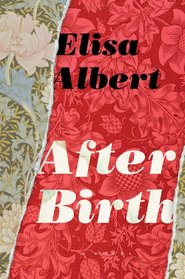This is such an honest book about one woman's experience with birth and post-partum depression. Ari has had a C-section and feels as if she did not really give birth to her son Walker. She is feeling alone, as she really doesn't have anyone who seems to understand her feelings about that, formula feeding, not getting any sleep and caring for her child.
The book is a little hard to read, as we are reading it like ambling thoughts that come into your brain and there is a lot of that. But isn't that how we all are? Just sometimes hard to follow.
The book is a little hard to read, as we are reading it like ambling thoughts that come into your brain and there is a lot of that. But isn't that how we all are? Just sometimes hard to follow.
The Book of Dahlia is one of my top-5 books of all time, so my expectations going into this were high, but maybe unfairly high. Much of what I really liked about Dahlia is present in After Birth, but it just didn't work as well for me this time around.
I have weirdly conflicted feelings about this book, as it seems to be both incredibly feminist and anti-feminist at the same time. Clearly from the descriptions in the novel Albert is very familiar with feminist literature and theory, probably moreso than I am, and so she may be able to defend this work in a way I'm just unprepared to do. Showing "the other side", if you will, of birth and motherhood is incredibly valuable, so much so that even the characters in here are aware that their criticisms and experiences are needed, if that makes sense. That being said, I felt uncomfortable with so many of the criticisms of women, instead of criticisms focused on societal structure and patriarchy that influence women to behave and act in certain ways. I also understand that there's something to be said for novels with an unlikable protagonist, and Dahlia was certainly unlikable in her own way, but the connections and empathy I felt for Dahlia weren't there for me with Ari for much of this.
As I mentioned, a lot of what we got in Dahlia still works beautifully here; Albert's observations about female adolescence are absolutely spot-on, and I really liked what came through in here about the importance of female friendships as well.
Even my review of this is structured as a comparison to Book of Dahlia, so maybe I'm just not giving this novel enough credit to stand on its own. I'm also happily prepared to admit I may not be the target audience for this book-Dahlia is a single twenty-something (like me), whereas I haven't gone through the experiences of either birth or motherhood, so maybe people who have lived more of this book will find more in here for them than I did. In the end, I didn't get the emotional punches to the gut from After Birth as I did from Book of Dahlia, but there's still a lot to like in here, even if I found the messages occasionally contradictory and confusing.
I have weirdly conflicted feelings about this book, as it seems to be both incredibly feminist and anti-feminist at the same time. Clearly from the descriptions in the novel Albert is very familiar with feminist literature and theory, probably moreso than I am, and so she may be able to defend this work in a way I'm just unprepared to do. Showing "the other side", if you will, of birth and motherhood is incredibly valuable, so much so that even the characters in here are aware that their criticisms and experiences are needed, if that makes sense. That being said, I felt uncomfortable with so many of the criticisms of women, instead of criticisms focused on societal structure and patriarchy that influence women to behave and act in certain ways. I also understand that there's something to be said for novels with an unlikable protagonist, and Dahlia was certainly unlikable in her own way, but the connections and empathy I felt for Dahlia weren't there for me with Ari for much of this.
As I mentioned, a lot of what we got in Dahlia still works beautifully here; Albert's observations about female adolescence are absolutely spot-on, and I really liked what came through in here about the importance of female friendships as well.
Even my review of this is structured as a comparison to Book of Dahlia, so maybe I'm just not giving this novel enough credit to stand on its own. I'm also happily prepared to admit I may not be the target audience for this book-Dahlia is a single twenty-something (like me), whereas I haven't gone through the experiences of either birth or motherhood, so maybe people who have lived more of this book will find more in here for them than I did. In the end, I didn't get the emotional punches to the gut from After Birth as I did from Book of Dahlia, but there's still a lot to like in here, even if I found the messages occasionally contradictory and confusing.




